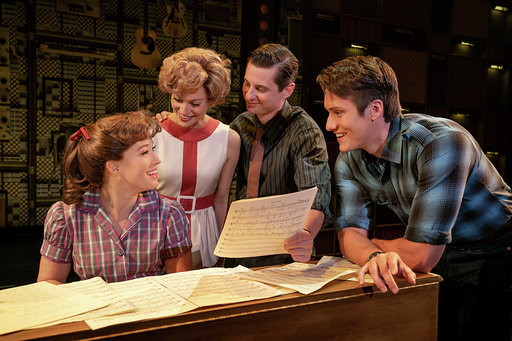The appeal of Beautiful: The Carole King Musical, which arrived in Thousand Oaks on February 13 for a four-day run, can be summed up by the comments of an elderly couple leaving the Fred Kavli Theatre after the show’s opening night performance. “I didn’t know she wrote all those songs!” one said to the other. “Yeah, she was really talented,” said the other.
It’s that “Ahh!” recognition factor that makes Beautiful an especially fun show to watch, those moments when King, played by Kennedy Caughell in the current national tour, comes up with a melody that turns out to be wholly familiar to 98% of the members of the audience. When Caughell strikes up the initial chords to such well-known songs as the Shirelles’ “Will You Still Love Me Tomorrow” or the Drifters’ “Up On the Roof,” you can hear the gasp of recognition from the audience, who have been bombarded for decades by airings of the songs, first on conventional oldies radio stations and still pervasive on streaming platforms.
Other than experiencing those moments, Beautiful is somewhat of a disappointment, Broadway’s usual slicing-and-dicing of an artist’s career, distorting facts, condensing timelines, and utilizing cardboard-cutout characters in presenting yet another formulaic and simplistic musical biography. Why does Broadway do this? The box office receipts for Beautiful, which has been a hit since it made its debut in 2014, bear out the reasons. Contemporary Broadway audiences want cheap entertainment without having to think very much, and with the splashy fun of Mamma Mia! setting a precedent two decades ago, most jukebox musicals end up shoehorning songs into generic stories with very little real drama, even though there are more interesting tales to tell that their writers never bother exploring. There is still, however, enough heart in Beautiful to make it enjoyable, despite its flaws, and a good representation of King’s early career.
So what makes Beautiful such an attraction? The answer is the terrific songs and a fabulous lead performance from Kennedy Caughell, the latest Carole clone. Caughell, however, is the real deal, a classically-trained pianist who fell in love with the music of King at an early age and was attracted to the fem-power part she plays in the show, tracing how the Brooklyn-born Carole Klein grows from a timid teen invading the music factory at 1650 Broadway, in the vicinity of midtown Manhattan’s Brill Building, only to become an important cog in the song placement/promotion machine of producer Don Kirshner, once described by Time magazine as “The Man With the Golden Ear.”
In the pop doldrums between Elvis and the Beatles, the area surrounding the Brill Building was the place where hits were made. Composers and lyricists virtually lived in their confining cubicles, which had little more than a spindly rehearsal piano and a couple of chairs, cranking out pop hits which Kirshner would dole out to a stable of girl groups with froofy names like the Chiffons and the Shirelles and harmless, watered-down, non-threatening boy singers like Bobby Vee and Neil Sedaka. In the pop-starved world of AM radio, teeny-bopper songs of young love ruled the airwaves, each with a predicted shelf life of five weeks before being replaced by the next song-with-a-hook. Young Carole King became the queen of such songs, her memorable, simple melodies highlighted by partner/husband Gerry Goffin’s easily digestible lyrics. Being in the same demographic as their listeners, King and Goffin had their collective fingers on their market’s pulse, and Kirshner turned to them often for ideas. Beautiful will have you believe that they churned out one hit after another, but their bonafide successes were few and far between and the result of much struggle and toil. A look at the Billboard charts shows that out of 60 some-odd Goffin/King songs that hit the charts between 1961 and 1966, only 11 made the top 10.

To its credit, Beautiful shows, in its simplistic way, how the pop music world worked in the early ’60s. It gets most of the chronology right and includes as a secondary couple, Goffin and King’s musical doppelgängers, Cynthia Weil and Barry Mann, friendly competitors in the Brill Building wars. Weil and Mann were the first to break out of the endless litany of frothy teen pop, penning the gritty, mature “On Broadway” for the Drifters in 1963 and then, the following year, writing the jukebox world’s most popular power ballad, “You’ve Lost That Lovin’ Feeling” for the Righteous Brothers. Although they had giant hits as well, Goffin and King never rose to those lofty songs of real greatness. It wasn’t until their marriage was on the rocks in the late ’60s that they started coming up with songs that had real bite, such as “(You Make Me Feel Like A) Natural Woman,” the breakthrough soul hit for Aretha Franklin, and two numbers from the Monkees’ magnum opus, Pisces, Aquarius, Capricorn & Jones Ltd.: “Pleasant Valley Sunday,” a cynical view of cookie-cutter suburbia, and “Star Collector,” a diatribe against the vacuousness of the band’s hordes of groupies.
What Beautiful misses is how Carole King grew from a writer of hit songs to a musical artist, transforming herself in a matter of a few years into one of the pioneers of the singer-songwriter movement of the 1970s. Along with James Taylor, King paved the way for dozens of writers who took to performing their own songs of self-examination, creating definable musical styles and creating miniature musical psychoanalyses. But this aspect of King’s career is treated as an afterthought, the natural result of a change in venue and a change in producer. King’s transformation was much more than that, but Beautiful makes it seem as if her maturing as a songwriter was instantaneous. It’s a shame that only a handful of King’s post-Goffin songs were used in Beautiful. Such gems as “Corazon,” “Sweet Seasons,” and “It’s Going to Take Some Time” were completely left out of the show, which ends with King’s triumphant solo concert at Carnegie Hall in 1971.
Aside from the terrific and mostly familiar songs, Beautiful is marred by book writer Douglas McGrath’s often insipid dialog. Characters such as King’s stereotypical Jewish mother (Rachel Coloff) and Nick, an incoherent long-haired sideman hitting on Carole (Matthew Amira) are embarrassments, while composer Barry Mann (the otherwise excellent James Michael Lambert) has been reduced to a one-joke hypochondriac while lyricist Cynthia Weil (Kathryn Boswell), exists mainly to resist Mann’s constant proposals of marriage in order to remain independent.
The part of Gerry Goffin, played with some charisma by James D. Gish, is so clumsily written that the audience is shocked by his sudden outbursts of anger at Carole for no apparent reason. In the show, Carole speculates that he might be on drugs, but there is no resolution or answer to his unexplainable behavior. In reality, Goffin was a bipolar, chronic philanderer; a fictional black singer named “Janelle Woods” has been concocted to represent all of Goffin’s dalliances, and their marriage was disrupted by Goffin fathering a child with another woman (singer Jeanie Reavis). Goffin also experimented with hallucinogens like LSD and mescaline, which led to the couple’s breakup, but none of that gets mentioned in the story. Instead, we see Goffin suffer a nervous breakdown and after a maudlin hospital room scene, pretty much vanishes from the story while King moves to California to go to work as a solo artist with producer Lou Adler. (The story also conveniently ignores the fact that by 1970, King was already married to her second husband, bassist Charlie Larkey.)
Don Kirshner, played with likability by Matt Loehr, is accurately portrayed as a pugnacious purveyor of lightweight hits and a good guy at heart, in contrast with the reputation of most cutthroat New York producers, but his character also doesn’t get fleshed out beyond light comic relief.
As it turns out, the best thing that happens to King is for her to get away from both Goffin and Kirshner, which allows her to grow as an artist. Her post-Goffin songs are thoughtful, more complex, and include generous elements of jazz and R&B that are not as evident in her more commercial hits of the early 1960s. Although some of her more famous songs from her decade with Adler’s Ode label are included (“It’s Too Late,” “You’ve Got a Friend,” “So Far Away,” and the title song), it’s not nearly enough to show the immense growth in King as a supreme songwriter, penning songs from the heart instead of for the wallet.
Other than Caughell’s outstanding performance as King, the show’s highlights include effective performances by the “artists” who make the Goffin/King catalog of songs famous: fine representations of the Drifters and the Shirelles, Nazarria Workman’s propulsive performance as King’s babysitter Little Eva (“The Loco-Motion”), and an especially incendiary performance by Matthew Amira and Nick Moulton as the Righteous Brothers (Bill Medley and Bobby Hatfield). It’s a shame the producers didn’t cast someone as Aretha Franklin to sing “Natural Woman,” one of the most important interpretations of a Goffin/King song, leaving it to Caughell to do her own version of it. Naturally, she hits it out of the park, but it was Franklin’s soulful rendition that helped make the song her own, and we need to see that transformation to show the growing depth of King’s talent as a writer during this period.
Despite its flaws, Beautiful is still a worthy show to see, even if it is just to revel in Caughell’s reverent performance and to relive the songs that were the soundtrack to many baby boomer’s lives. That, in itself, is “Some Kind of Wonderful.”
************************
Beautiful: The Carole King Musical plays through Sunday, February 16 at the Fred Kavli Theatre. For dates and showtimes, see the VC On Stage Calendar.






No Comments